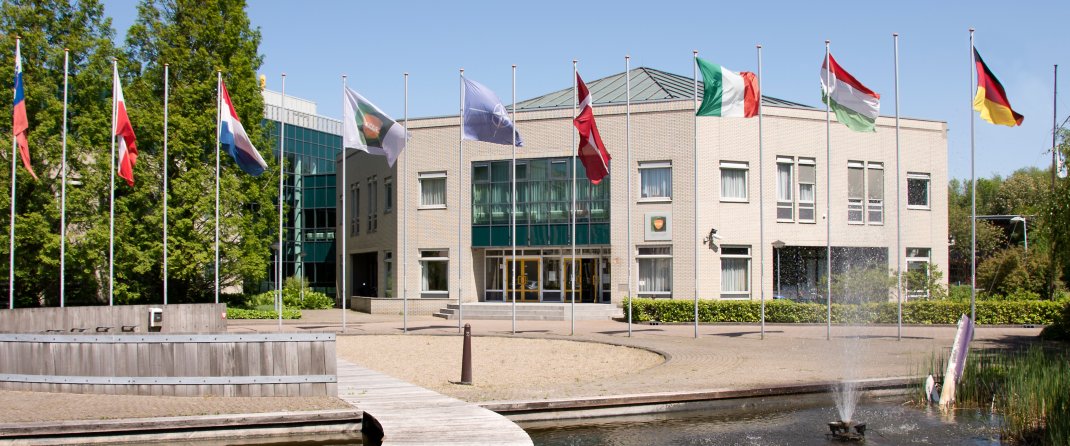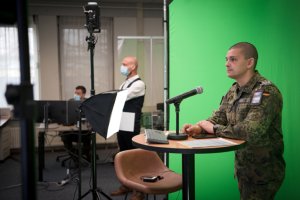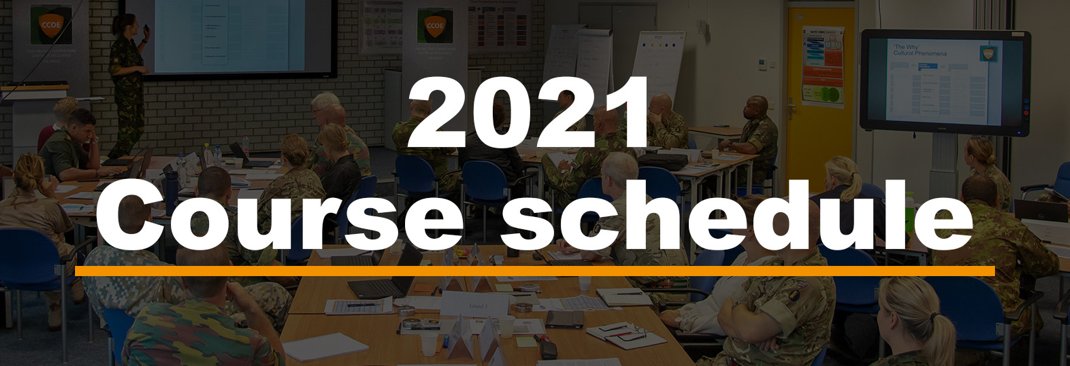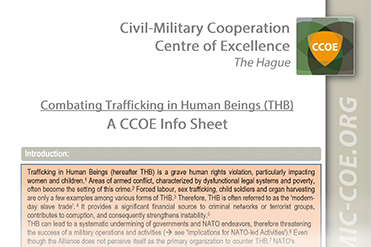CIMIC Messenger 2021-07
Dear CIMIC & CMI Community,
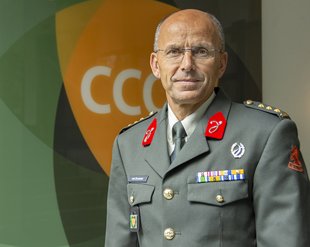
It is with pleasure that I introduce to you the 2021-Q2 edition of the CIMIC Messenger. Again I want to start with conveying that I hope that you are all staying safe; despite hopeful developments, present-day is still a challenging time.
With the scheduled activities throughout the year as a basis, the CCOE was looking forward to 2021 to invest in the interaction and productive cooperation within the CIMIC & CMI Community. However, the cancellation of most physical events due to the impact of the pandemic is still a fact. Nevertheless, like the second half of 2020, the numerous online activities in the first half of 2021, including training & education events, have provided many occasions to enhance cooperation in the field of CIMIC & CMI.
Topics of this edition of the CIMIC Messenger:
· CCOE Seminar Series: "Engaging in Civil-Military Information Sharing"
· Master of Arts - Civil-Military Interaction
· CIMIC & CMI Annual Discipline Conference 2021
· An important milestone for the CCOE
· New Info Sheet: Combating Trafficking in Human Beings (THB)
· Lived Civil-Military Cooperation needed more than ever
Enjoy reading, make use of the information provided and pass it on. You know where to find us: online, or expectantly in The Hague, the International City of Peace and Justice!
Best Regards,
Colonel Frank van Boxmeer MSc
DIRECTOR CCOE
"Engaging in Civil-Military Information Sharing"
Conceptual observations and practitioners’ experience from different perspectives
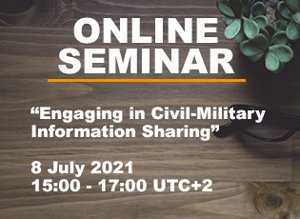 In 2020, CCOE carried out a study to identify impediments and promoters of civil-military information sharing. The results are based on extensive literature research and interviews with practitioners focusing on lessons identified from missions in Afghanistan, Kosovo and Mali.
In 2020, CCOE carried out a study to identify impediments and promoters of civil-military information sharing. The results are based on extensive literature research and interviews with practitioners focusing on lessons identified from missions in Afghanistan, Kosovo and Mali.
As part of our recently established seminar series, the upcoming CCOE Online Seminar will provide the floor to elaborate on the findings in detail. CDR Rene Halfmann, CCOE's Branch Chief Lessons Learned and Analysis Branch, will explain the motivation behind information sharing in general and which principles apply in information sharing processes. These conceptual considerations will be enriched by practical applications of UN-CMCoord Key Elements, presented by Mr Ronaldo Reario, UN OCHA Civil-Military Coordination Service.
Furthermore, the growing importance of the cyber domain needs to be acknowledged. Therefore the seminar will also provide the opportunity to discuss the question: How can conceptual and practical lessons from previous missions be translated into the digital domain?
For this matter, Godfrey Takavarasha, Data Manager at the Centre for Humanitarian Data, will share his experience in the field of Open Data Sharing in the Humanitarian Community. Finally, the seminar will conclude with a panel discussion and extensive room for questions and answers. The seminar will be open to the public and can be joined via Webex.
The Seminar will take place on Thursday, 08 July 2021, from 15.00 till 17.00 (UTC+2).
For questions, do not hesitate to contact us via civilmilitaryanalysis@cimic-coe.org
Master of Arts - Civil-Military Interaction
The field of Civil-Military Interaction (CMI) applies to different types of contexts, comprises a complex set of topics, and requires a variety of actors and activities. More specifically, it is relevant both in peacetime and in times of conflict and plays a significant role in facilitating a comprehensive approach. It matters across all military levels and disciplines, with CIMIC taking the main role. Similarly, it is relevant to a variety of civilian professions, including but not limited to professions within the public and private sector, the humanitarian and development domain.
This broad spectrum of contexts, topics, actors, and activities requires inter-discipline and inter-organizational information exchange, understanding and efforts. Respectively, actors working in the field of CMI require profound knowledge and experience as well as different competencies and skills, not only concerning one’s own role but including different angles and perspectives.
To provide military and civilian personnel with CMI relevant knowledge, competencies and skills, the Helmut Schmidt University/University of the Federal Armed Forces Hamburg (HSU) and the Civil-Military Cooperation Centre of Excellence (CCOE) developed and implemented an accredited Master programme in Civil-Military Interaction (MCMI). The programme is conducted in English and takes approximately 2 years to finish. However, the time varies according to everyone’s individual studying pace.
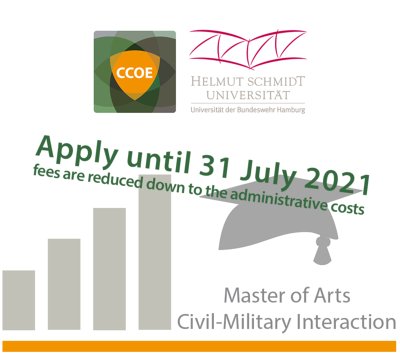 The MCMI takes place either virtually or at the HSU in Hamburg, Germany, and the CCOE in The Hague, The Netherlands. However, in addition to the established professors of the HSU/UniBw H and experienced trainers at the CCOE, guest lecturers from several other European universities give classes for the MCMI, such as Prof. Bert George (Ghent University, Belgium), Prof. Joachim Koop (Leiden University, The Netherlands) and Prof. Michal Onderco (Erasmus University Rotterdam, The Netherlands) to name a few. This network does not only offer a broader spectrum of classes and topics but also provides diverse perspectives.
The MCMI takes place either virtually or at the HSU in Hamburg, Germany, and the CCOE in The Hague, The Netherlands. However, in addition to the established professors of the HSU/UniBw H and experienced trainers at the CCOE, guest lecturers from several other European universities give classes for the MCMI, such as Prof. Bert George (Ghent University, Belgium), Prof. Joachim Koop (Leiden University, The Netherlands) and Prof. Michal Onderco (Erasmus University Rotterdam, The Netherlands) to name a few. This network does not only offer a broader spectrum of classes and topics but also provides diverse perspectives.
The international MCMI educates and trains civilian and military personnel in the field of CMI. It offers a mix of academic perspectives and practical training, including academic methods, academic grounded CMI knowledge, practical CIMIC-specific training, and an individual master thesis with a respective preparation module. Successful completion of these modules enables students to pursue a career within the broad spectrum of CMI and to perform respective civil or military command functions in future.
The current multinational student body has a broad range of professional and academic backgrounds, including military personnel and civilians from the public, private and humanitarian sectors. The diversity of students offers a unique opportunity for versatile discussions and the exchange of knowledge, experience, ideas and perspectives.
The next iteration will start on 1 November 2021; applications are accepted until 31 July 2021. For further information regarding the MCMI, the application requirements or the process, please visit the CCOE’s website or the HSU’s website.
Benefit: The fees are reduced down to the administrative costs. Students have to pay max. 600€ (once, inclusive obligated courses) for the whole program!
CIMIC & CMI Annual Discipline Conference 2021
Once again, the CCOE has hosted the Annual Discipline Conference (ADC) for the CIMIC & CMI discipline, including Resilience through Civil Preparedness. As in 2020, the conference was conducted virtually with participants from the CIMIC & CMI community, including other NATO disciplines and various military and civilian training facilities and organisations.
The audience was welcomed with opening remarks by the 'CCOE's Director, COL Frank van Boxmeer, a keynote speech by SHAPE DCOS PD, Rear Admiral Turan, and ACT JFD representative, Major Fisnik Shtini.
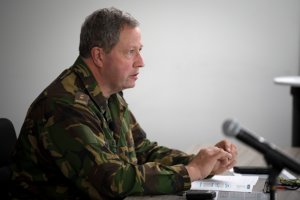 Representing the CIMIC & CMI Requirement Authority (SHAPE), LTC Rene Daalman presented key developments within the CIMIC & CMI discipline, including an update on Resilience through Civil Preparedness, the MC 411/2 and the SACEUR's Annual Guidance for Education and Training (SAGE), and reviewed the impact of the COVID-19 pandemic on NATO training & education. LTC Daalman continued by outlining this 'year's changes in the CIMIC & CMI Training Requirement Analysis (TRA), including the addition of the Joint Support and Enabling Command (JSEC) to the target audience at an operational level and a new functional area called "CIMIC & CMI Analysis, Assessment and Advice".
Representing the CIMIC & CMI Requirement Authority (SHAPE), LTC Rene Daalman presented key developments within the CIMIC & CMI discipline, including an update on Resilience through Civil Preparedness, the MC 411/2 and the SACEUR's Annual Guidance for Education and Training (SAGE), and reviewed the impact of the COVID-19 pandemic on NATO training & education. LTC Daalman continued by outlining this 'year's changes in the CIMIC & CMI Training Requirement Analysis (TRA), including the addition of the Joint Support and Enabling Command (JSEC) to the target audience at an operational level and a new functional area called "CIMIC & CMI Analysis, Assessment and Advice".
Based on these changes, LTC Jan Brouwer, representing the CIMIC & CMI Department Head, discussed the prospective alignment of CIMIC & CMI training requirements and solutions. He further highlighted recent best practices and improvements regarding CIMIC & CMI training and education; thereby complementing the 'community's quick adaption to COVID-19-driven circumstances and the development of both online and virtual courses. Additionally, LTC Brouwer announced a comparative assessment of the NATO CIMIC & CMI course landscape at a lower tactical level in near future. The assessment will include a cross-check of training objectives and requirements to ensure validity and to avoid unnecessary duplications and redundancies. On a similar note, LTC Brouwer encouraged the broadening of the training landscape to include non-NATO courses as possible add-ons to the current CIMIC & CMI training and education landscape.
In addition to these well-known ADC topics, this 'year's conference had several new items on the agenda! Due to new guidelines provided by ACT in fall 2020, the ADC included an introduction and update of key partners of the CIMIC & CMI discipline.
First, different CIMIC & CMI relevant NATO Education and Training Facilities (ETFs) provided 5-minutes updates on their CIMIC & CMI related affairs and courses. Besides the 'CCOE's own update in its role as an ETF, the Swedish Armed Forces International Centre, the Multinational CIMIC Group, and the NATO School Oberammergau introduced their organisations and briefed on current developments regarding CIMIC & CMI related education and training.
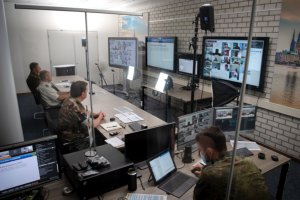 The ETF perspective was followed by an update of some of the 'CCOE's key partners. In this context, the European Security and Defence College (ESDC), the United Nations Office for the Coordination of Humanitarian Affairs (UNOCHA), the Department Head for Military Contribution to Peace Support (MC2PS), the Department Head for Maritime Operations (MAROPS), and the University of the Federal Armed Forces Hamburg (German abbreviation: HSU) introduced themselves and commented on their CIMIC & CMI related matters and training.
The ETF perspective was followed by an update of some of the 'CCOE's key partners. In this context, the European Security and Defence College (ESDC), the United Nations Office for the Coordination of Humanitarian Affairs (UNOCHA), the Department Head for Military Contribution to Peace Support (MC2PS), the Department Head for Maritime Operations (MAROPS), and the University of the Federal Armed Forces Hamburg (German abbreviation: HSU) introduced themselves and commented on their CIMIC & CMI related matters and training.
Besides common topics, such as the impact of the COVID-19 pandemic and the support for enhanced cooperation, each representative shared individual aspects and best practices. Doing so has not only provided a multifaceted and interesting conference afternoon but encouraged new, common projects.
On day two, the conference focused on 'NATO's Strategic Initiative 5 (SI5) which outlines Allied Command 'Operations' (ACO) desire to establish a CIMIC Analysis & Assessment (CIMIC A&A) capability. This initiative did not only have the most considerable impact on this 'year's CIMIC & CMI TRA update but has also initiated the development of a so far not existing CIMIC A&A concept and respective training solutions.
Kicking off the CIMIC A&A topic, LTC Christian Koch (SHAPE) provided background information and the current status and way ahead of the SI5.
Subsequently, Major Ralf Baur introduced the coming CIMIC A&A concept and explained its underlying approach. The new CIMIC A&A concept will be the guiding reference document. The concept does not only provide a workflow, tools and techniques to conduct CIMIC A&A but also puts it into a broader perspective by defining the civil environment and elaborating the process of understanding it. The concept further outlines the contribution of CIMIC A&A at the tactical, operational and strategic level as well as to 'NATO's contribution to a Comprehensive Approach. For further information on CIMIC A&A, please see our website!
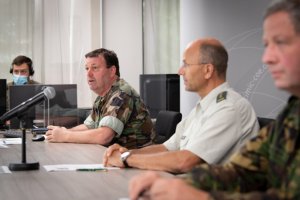 Finally, LTC Jan Brouwer provided a training and education perspective and announced the assessment and development of CIMIC A&A training opportunities in near future. These opportunities will train - but 'won't be limited to - CIMIC A&A staff, on how to analyse and assess the civil environment in order to give advice and to contribute to the 'Commander's decision-making process.
Finally, LTC Jan Brouwer provided a training and education perspective and announced the assessment and development of CIMIC A&A training opportunities in near future. These opportunities will train - but 'won't be limited to - CIMIC A&A staff, on how to analyse and assess the civil environment in order to give advice and to contribute to the 'Commander's decision-making process.
After deep-diving into 'NATO's SI5, a discussion among 'NATO's Joint Force Commands and the JSEC marked the end of the conference. The discussion particularly focused on the roles and responsibilities of JSEC and its delineation from the other Commands.
Finally, an overall Q&A session and a keynote speech by SHAPE ACOS PD J9, BGR Lebrun, concluded the CIMIC & CMI ADC 2021.
An important milestone for the CCOE
The CIMIC Centre of Excellence (CCOE) reached an important milestone in its activities in mid-May. With the NATO CIMIC HIGHER COMMAND COURSE (NCHCC) as the final piece in the CCOE's course landscape Covid adaptations, it now offers its entire curriculum online. And even meeting the course requirements set by NATO.
This means that the decision-making power and flexibility of the NATO CCOE has received an enormous boost.
For the first time, the NATO CIMIC Higher Command Course was held as a virtual event. Participants from NATO and non-NATO nations attended the two-week course from their offices or homes.
Informative and educational lectures were complemented by presentations from external subject matter experts from SHAPE and the Joint Force Commands (JFC). The content of the NCHCC is primarily aimed at personnel working on operational level in NATO J9 functions or who are scheduled to conduct a mission in the CIMIC context.
The CCOE provides participants with comprehensive knowledge of the NATO operational planning process by teaching the role of CIMIC during the phases of the COPD (Comprehensive Operations Planning Directive) and specifically the necessary CIMIC-related products. The target audience is from OF3 to OF6 - but individual exceptions are possible. So, civilians are also welcomed to actually share the comprehensive approach and expand the CIMIC network in the community of interest.
The latest iteration was particularly challenging due to the online environment, but students from nine countries adapted to online learning and contributed their experiences whenever possible.
As a novelty, a high number of academic students from the University of Hamburg, Germany, participated and incorporated their prior individual knowledge into the course through it is compulsory as part of the Master of Arts – Civil-Military Interaction (MCMI) programme.
If the current developments in the COVID-19 pandemic allow, the next course in December 2021 will again be an on-site course at the CCOE in The Hague, The Netherlands. The registration for the course is available on our course schedule.
Whatever the future dictates the CCOE to adapt, the further development of on-line teaching to a higher professional level will continue anyhow. 2nd half of 2021 and beginning 2022 the T&E Branch will look into this part of enhancing didactical possibilities.
Lived civil-military cooperation needed more than ever
By Jule Brischar
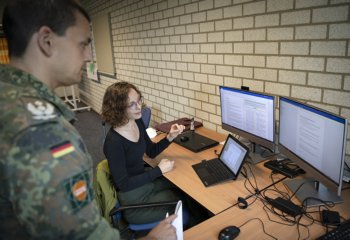 The Technical University of Applied Sciences Regensburg (OTH) and the NATO Civil-Military Cooperation Centre of Excellence (CCOE) are proud to build on several years of fruitful cooperation and look forward to the partnership being continued in the future.
The Technical University of Applied Sciences Regensburg (OTH) and the NATO Civil-Military Cooperation Centre of Excellence (CCOE) are proud to build on several years of fruitful cooperation and look forward to the partnership being continued in the future.
The two institutions bridge the gap between applied security politics and academia as they share experiences, ideas, and expertise on various topics around civil-military cooperation. The partnership acknowledges that we cannot resolve the crises of our times alone but need enhanced communication, cooperation, and collaboration.
Over the years, personal conversations and interactions have created a foundation of trust on which open dialogue and critical discussions can be held today. Beyond that, also institutional barriers of cooperation have been dismantled and the exchange of personnel further fostered the relationship. Several times already, students from the OTH’s B.A. programme International Relations and Management joined the CCOE as interns which provides them with the unique opportunity to gain first-handed insights into working at an accredited NATO institution. In return, they feed new ideas and the latest findings from academic research into the CCOE‘s work, contributing to several training and education solutions but also recent concept developments.
Vice versa, practitioners from the CCOE enrich the OTH‘s curriculum by joining lectures and exercises. Sharing their personal experiences allows for students to deepen an understanding of the theoretical concepts they study, and to better be prepared for entering this professional environment themselves.
Technical University of Applied Sciences Regensburg
OTH Regensburg is one of the largest institutions of applied sciences in Bavaria, Germany, that offer over 20 Bachelor’s degree programmes across various disciplines.
The Bachelor’s programme International Relations and Management offer a multi-disciplinary education in intercultural competencies as well as insights into the political, economic, and social relations between states and (international) organisations. Students of this programme from early on have the possibility to join 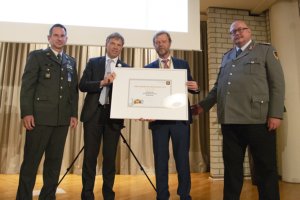 extracurricular seminars and exercises on security-related issues. Prof. Dr Markus Bresinsky is professor for international politics and social sciences at the OTH and the academic supervisor of the GLOBE exercise as well as the initiator and focal point for the OTH - CCOE partnership.
extracurricular seminars and exercises on security-related issues. Prof. Dr Markus Bresinsky is professor for international politics and social sciences at the OTH and the academic supervisor of the GLOBE exercise as well as the initiator and focal point for the OTH - CCOE partnership.
In 2019, the OTH was awarded the Institutional CIMIC Award of Excellence for its extraordinary collaboration with national and multinational organisations in its coursework on international security and peace.
The CCOE CIMIC Messenger is a publication of the CIMIC Centre of Excellence. Its dedicated aim is to provide a forum or platform for stimulating and presenting innovative and comprehensive thinking on NATO CIMIC and Civil-Military Interaction (CMI) related issues such as Mission experiences, concepts, doctrine or lessons learned. The views and opinions expressed or implied in the CCOE CIMIC Messenger are those of the authors and should not be construed as carrying the official sanction of NATO, of any national armed Forces or those of CCOE.
“See you in The Hague!”
